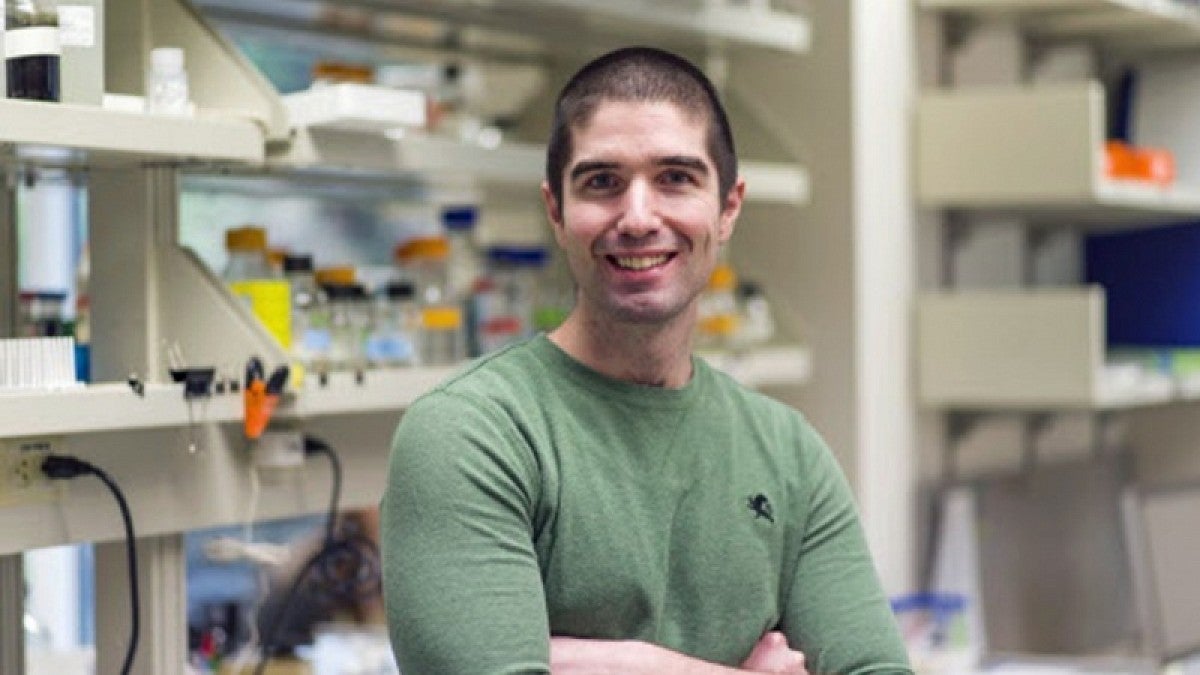Jeff McKnight, a prolific and creative researcher whose inquisitiveness extended to those around him in UO’s Institute of Molecular Biology, died Sunday after battling lymphoma. He was 36.
McKnight learned six months ago that he had a rare form of lymphoma. He died Sunday, soon after celebrating his daughter Katherine’s 8th birthday. His wife, Laura, the manager of his research lab, shared the news of his death on Twitter, where McKnight posted regularly about his battle with the disease.
“Life is short — enjoy your good days. Hug your family. Don’t waste time on things that don’t interest you,” McKnight wrote in one of his posts. “Love each other. Forgive each other. Find balance in your life and maintain it.”
Bruce Bowerman, head of the UO’s Department of Biology, said that McKnight represented all the best qualities of a scientist; remarkably productive and creative, he was also a caring person who reached out to others in need, Bowerman said.
“He exemplified what all of us in the Institute of Molecular Biology want our group to continue to be: a place where we value both science and decency,” Bowerman said. “It is so sad that we have lost Jeff, who did so much to sustain that spirit here, and will continue to do so even in his absence. Jeff was remarkable for being both an outstanding scientist and a remarkably gracious and compassionate colleague.”
McKnight specialized in a field of research focused on the structure and function of chromatin, the substance of our chromosomes. He joined the university in 2016 as part of UO’s Clusters of Excellence initiative, which sought to bring the best and brightest minds in select fields to the University of Oregon.
“Jeff quickly established himself as an extremely valuable member of our faculty, and the community’s deep sorrow at his passing is a clear testament to his qualities as a person as well,” said UO Provost and Senior Vice President Patrick Phillips. “His illness — and his incredibly brave response to it — struck a chord with scientists and many others across the entire country.”
Biologist Diana Libuda, a colleague of McKnight’s in the Genome Function group, recalled McKnight’s compassion, his infectious love of science and his propensity for enthusiastically raising his hand at the end of every research seminar and trainee talk to ask an insightful question. He often dropped into the offices of neighboring scientists to share his latest scientific idea or offer a treat from his stash of international snack items, which arrived in the mail through a monthly subscription service.
“Jeff encompassed all that one would want in a colleague, mentor, and friend — compassionate, kind, intelligent, funny, and inquisitive,” Libuda said. “He left an indelible impression on me, UO and the world. UO and the greater scientific community are not the same without him, but he has made myself and everyone here better because of his unparalleled compassion, kindness, and pure joy for science and life.”
Hal Sadofsky, UO’s divisional dean of natural sciences, said McKnight was interested not only in advancing his own research, but in mentoring others around him and in being a part of a community of scientists at the UO. “Jeff was kind of this amazing combination of brilliant scientist but also incredibly generous and outgoing person,” Sadofsky said. “When we’re mentoring assistant professors, we talk about how your job is concentrating on your own research. Jeff was doing that, but he was also focused on helping other junior scientists.”
One of those who benefited from McKnight’s desire to help those around him was UO biologist David Garcia, a member of genome cluster group who was hired after McKnight. In a series of tweets he posted following the news of McKnight’s death, Garcia recalled how McKnight went out of his way to welcome him warmly to the UO before he had even arrived.
In early 2020, Garcia and McKnight had nearly finished working together to organize a genome function scientific symposium when the coronavirus pandemic hit. Shortly thereafter, McKnight fell ill and it seemed that COVID-19 was responsible for his symptoms. After several tests came back negative, he was diagnosed with hepatosplenic T-cell lymphoma.
In the months between his diagnosis and his death, McKnight traveled to Seattle for treatment, while his wife continued to run his research lab. Even as he underwent blood transfusions, chemotherapy, bone marrow biopsies and other painful treatments, he continued to encourage his students and colleagues on the publication of new papers, the announcement of new grants, the acceptance into research programs and other successes on social media and elsewhere.
Days before his death, he established a GoFund me site for his wife and daughter, with a goal of raising $200,000. The site has raised nearly $380,000 to date.
The Institute of Molecular Biology is establishing a fund to honor McKnight and give recognition to his life and work. In addition to the GoFund me site McKnight set up, a separate fund has been established by a friend of the family to cover medical expenses. —By Lewis Taylor, University Communications


